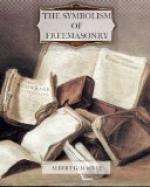[141] “A mythis omnis priscorum hominum tum historia tum philosophia procedit.”—Ad Apollod. Athen. Biblioth. not. f. p. 3.—And Faber says, “Allegory and personification were peculiarly agreeable to the genius of antiquity; and the simplicity of truth was continually sacrificed at the shrine of poetical decoration.”—On the Cabiri.
[142] See Grote, History of Greece, vol. i. ch. xvi. p. 479, whence this definition has been substantially derived. The definitions of Creuzer, Hermann, Buttmann, Heyne, Welcker, Voss, and Mueller are none of them Better, and some of them not as good.
[143] Hist. of Greece, vol. i. ch. xvi. p. 579. The idea of the existence of an enlightened people, who lived at a remote era, and came from the East, was a very prevalent notion among the ancient traditions. It is corroborative of this that the Hebrew word kedem, signifies, in respect to place, the east, and, in respect to time, olden time, ancient days. The phrase in Isaiah xix. 11, which reads, “I am the son of the wise, the son of ancient kings,” might just as well have been translated “the son of kings of the East.” In a note to the passage Ezek. xliii. 2, “the glory of the God of Israel came from the way of the East,” Adam Clarke says, “All knowledge, all religion, and all arts and sciences, have travelled, according to the course of the sun, FROM EAST TO WEST!” Bazot tells us (in his Manuel du Franc-macon, p. 154) that “the veneration which masons entertain for the east confirms an opinion previously announced, that the religious system of Masonry came from the east, and has reference to the primitive religion, whose first corruption was the worship of the sun.” And lastly, the masonic reader will recollect the answer given in the Leland MS. to the question respecting the origin of Masonry, namely, “It did begin” (I modernize the orthography) “with the first men in the east, which were before the first men of the west; and coming westerly, it hath brought herewith all comforts to the wild and comfortless.” Locke’s commentary on this answer may conclude this note: “It should seem, by this, that masons believe there were men in the east before Adam, who is called the ’first man of the west,’ and that arts and sciences began in the east. Some authors, of great note for learning, have been of the same opinion; and it is certain that Europe and Africa (which, in respect to Asia, may be called western countries) were wild and savage long after arts and politeness of manners were in great perfection in China and the Indies.” The Talmudists make the same allusions to the superiority of the east. Thus, Rabbi Bechai says, “Adam was created with his face towards the east that he might behold the light and the rising sun, whence the east was to him the anterior part of the world.”
[144] Strauss makes a division of myths into historical, philosophical, and poetical.—Leben Jesu.—His poetical myth agrees with my first division, his philosophical with my second, and his historical with my third. But I object to the word poetical, as a distinctive term, because all myths have their foundation in the poetic idea.




